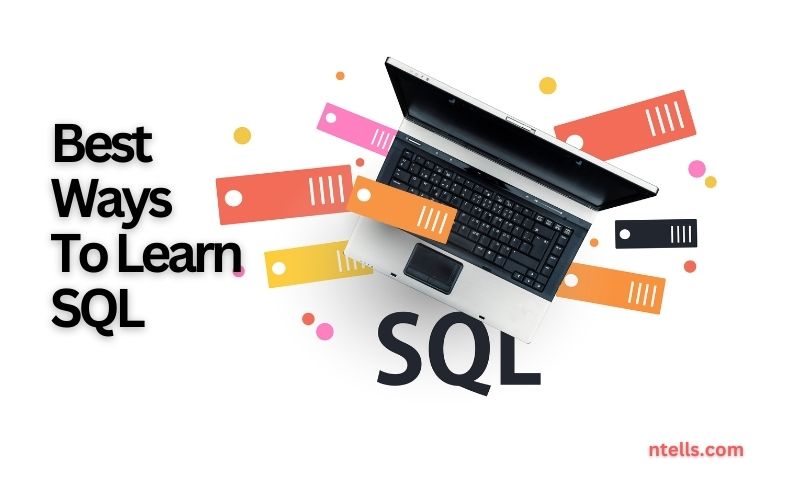Structured Query Language (SQL) has become an integral part of the modern technology landscape. Whether you’re a data analyst, a software developer, a business professional, or even a student, having a solid grasp of SQL can open doors to a plethora of opportunities. From managing databases to extracting valuable insights from data, SQL proficiency is a sought-after skill.

In this article, we will explore the best ways to learn SQL, catering to various learning preferences and levels of expertise.
1. Online Tutorials and Courses
The internet offers a treasure trove of resources for learning SQL. Online tutorials and courses provide a structured approach to learning, making it suitable for beginners and intermediate learners. Platforms like Coursera, Udemy, Khan Academy, and Codecademy offer courses ranging from introductory SQL to advanced database management. These courses often include video lectures, interactive coding exercises, quizzes, and projects, allowing learners to gain hands-on experience.
2. Interactive Coding Platforms
For those who prefer a hands-on learning experience, interactive coding platforms like LeetCode, HackerRank, and SQLZoo are excellent choices. These platforms offer challenges and exercises that require learners to write SQL queries to solve real-world problems. The instant feedback provided by these platforms enhances learning by highlighting areas that need improvement. They also encourage problem-solving and critical thinking skills, which are crucial for mastering SQL.
3. Books and Documentation
Traditional learners might find value in books and official documentation. Titles like “SQL For Dummies” by Allen G. Taylor and “Learning SQL” by Alan Beaulieu provide comprehensive guides to learning SQL from scratch. Additionally, consulting the official documentation of widely used database systems like MySQL, PostgreSQL, or Microsoft SQL Server can deepen your understanding of SQL concepts and syntax.
4. YouTube Video Tutorials
Visual learners can benefit from YouTube video tutorials. Many experienced SQL practitioners and educators share their knowledge through video content. Channels like “thenewboston,” “Programming with Mosh,” and “Academind” offer step-by-step tutorials, demonstrations, and explanations of SQL concepts. These videos often cater to both beginners and those looking to advance their skills.
5. Practice with Real Databases
Theory is important, but real-world practice is where you truly solidify your SQL skills. Consider working with real databases to apply your knowledge. You could set up a personal project, such as creating a small e-commerce database or managing a collection of your favorite books. Alternatively, you can find publicly available datasets online and use them to practice writing queries that extract meaningful insights.
6. Join Online Communities
Engaging with others who are learning SQL or already proficient in it can enhance your learning experience. Online communities like Stack Overflow, Reddit’s r/SQL subreddit, and various LinkedIn groups allow you to ask questions, share your challenges, and learn from others’ experiences. Collaborating with a community can provide alternative solutions, insights, and different perspectives on SQL-related problems.
7. Enroll in University Courses
For those seeking a more formal and in-depth education in SQL, enrolling in university or college courses is a viable option. Many institutions offer database management courses as part of their computer science or information technology curricula. These courses often cover both theoretical concepts and practical applications of SQL, providing a well-rounded education in database systems.
8. Build Personal Projects
Nothing solidifies learning like hands-on experience. Create personal projects that require you to apply SQL concepts. This could be a budget tracking application, a blogging platform, or a simple inventory management system. Building these projects not only showcases your skills but also provides a concrete demonstration of your abilities to potential employers or collaborators.
9. Attend Workshops and Conferences
Keep an eye out for SQL workshops and conferences in your area or online. These events bring together SQL enthusiasts, experts, and educators to share their insights, experiences, and latest developments in the field. Attending workshops and conferences can provide networking opportunities, exposure to advanced topics, and a chance to learn from industry leaders.
10. Teach Others:
The best way to reinforce your own understanding of a subject is to teach it to someone else. As you progress in your SQL learning journey, consider mentoring or tutoring others who are just starting out. Explaining SQL concepts to beginners can help you identify gaps in your knowledge and strengthen your foundational understanding.
In conclusion, learning SQL is a valuable investment in your personal and professional growth. The diverse range of resources and methods available ensures that there’s a learning approach suited to every individual. Whether you’re a visual learner who thrives on video tutorials, a hands-on coder who prefers interactive platforms, or someone who enjoys the structure of formal courses, the world of SQL learning has something for you.
Embrace a combination of these methods, practice consistently, and watch as your SQL proficiency grows, opening doors to exciting opportunities in the world of data management and analysis.
Categories: Tech
Tags: sql
Leave a Reply